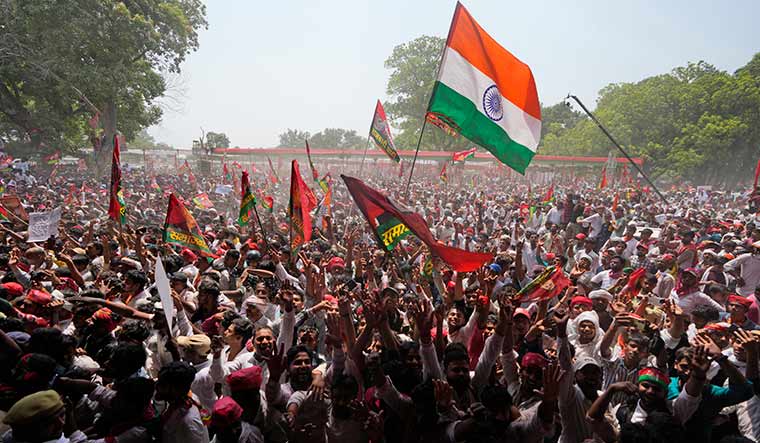Elections are mercurial. Pick an end from here, and all other ends slip away.
When reporting across Uttar Pradesh, there were certain recurrent utterances: five kilos of grains are too little, especially when they are of poor quality. Why was it difficult to get jobs? Why was there no improvement in an individual’s life? Was it all aimed at creating a worthless generation?
Remember, 10 years is a long time in electoral politics. And what seemed enticing then―free cylinder, for example―makes no sense now, as there is the despondent realisation that there is no money for a refill.
There is also something to be said about the omnipresent face of Narendra Modi. It became too much. Tag Mandir to Muslim to Modi, and the chants became distasteful. “Don’t they have anything else to talk about?” was an oft-heard retort.
Akhilesh Yadav, often derided as being part of team do ladke (two boys)―the other being Rahul Gandhi―ran a campaign where he took no names. Yes, he said that the BJP was a party of lies. In his campaign, he spoke of his party’s manifesto―of giving pension to women, doing away with the Agniveer scheme and safeguarding the Constitution. It might be a pale campaign, but do not doubt what a big rallying point the Constitution is. To those who have nothing, it is still a lodestar―a hope that change will come.
Yadav made other smart choices that, at first glance, defied logic. One, he changed candidates in 11 seats, many at the last minute. Two, ticket distribution went beyond Muslims and Yadavs. Three, he brought together the family (all five members won), yet did not cave in to any demand such as handing out a ticket to uncle, Shivpal Yadav.
The Samajwadi Party manifesto made catchy promises like atta and data, while also touching upon more nuanced issues like minimum support price. Akhilesh also did not forget to remind the electorate that many achievements this government touted as its own, such as highways, were initiated under Samajwadi rule.
Notably, these results mark the definite demise of the labharthi or beneficiary caste. There is the overriding issue of how to add value to life without being ‘just’ a beneficiary. Psychologically, it would be repulsive to be categorised as only a labharthi with no agency of one’s own.
There is also that matter of dancing for a world stage. While a city like Ayodhya might be a glittering tourist success, it is not a shiny story for the voters themselves. Many lost their livelihood to the roads built for the temple. It is not the locals who use the airport, and not them who are charmed by selfie points.
In Varanasi, where improvements in lived reality are marginal, Modi won by a margin of 1.5 lakh votes, much lower than in the 2019. Ajay Rai, the Congress candidate since 2014, went from 1.52 lakh in 2019 to 4.60 lakh this time.
Also Read
- PM Modi's challenge in third term is to reorient his image to that of a consensus builder
- Congress kept its ear and feet to the ground to script a remarkable resurgence
- Decoding Maharashtra poll verdict: Anger, sympathy and Sharad Pawar’s skilful moves
- How Mamata Banerjee and nephew Abhishek upped the poll game in Bengal
- BJP’s southern push comes a cropper in Tamil Nadu
- Voters have changed, and we have benefited: Suresh Gopi
One important, albeit silent, note in this election is the Bahujan Samaj Party, which has drawn a blank. This seat count is not new for the BSP; in 2014, too, it won no seats. But its constant battering means that the core voter might start looking elsewhere. In Nagina, Chandrashekhar of the Aazad Samaj Party (Kanshi Ram) scored his party’s first Lok Sabha win by a margin of 1.5 lakh votes. His politics is mercurial and draws from his charisma, but if tempered it could start changing the direction of the dalit vote.
Finally, to the question of Yogi Adityanath, the chief minister whose opinion on a number of seats was overlooked. He has drawn vocal opposition from strongmen like Brijbhushan Sharan Singh. But, from the party’s reduced numbers, his strength will grow. Assembly elections are due in 2027. And to strike at him in any way will further undermine the party’s chances.
In an optimistic reading of the ticker, this could be the only good news for the BJP. But then elections are mercurial. And outcomes shall continue to stump the best readings.


